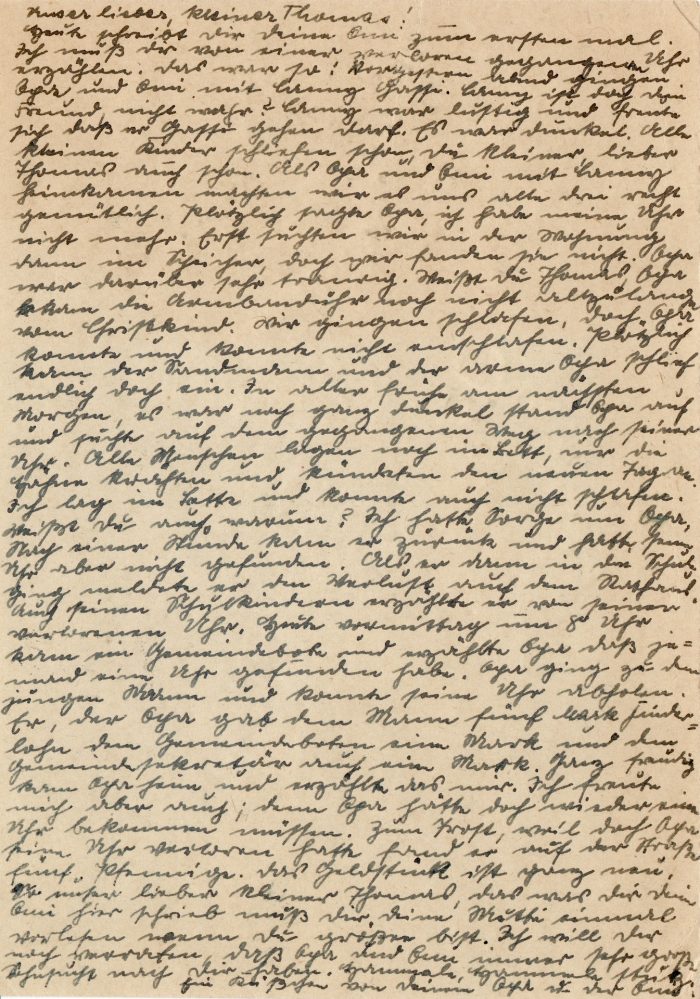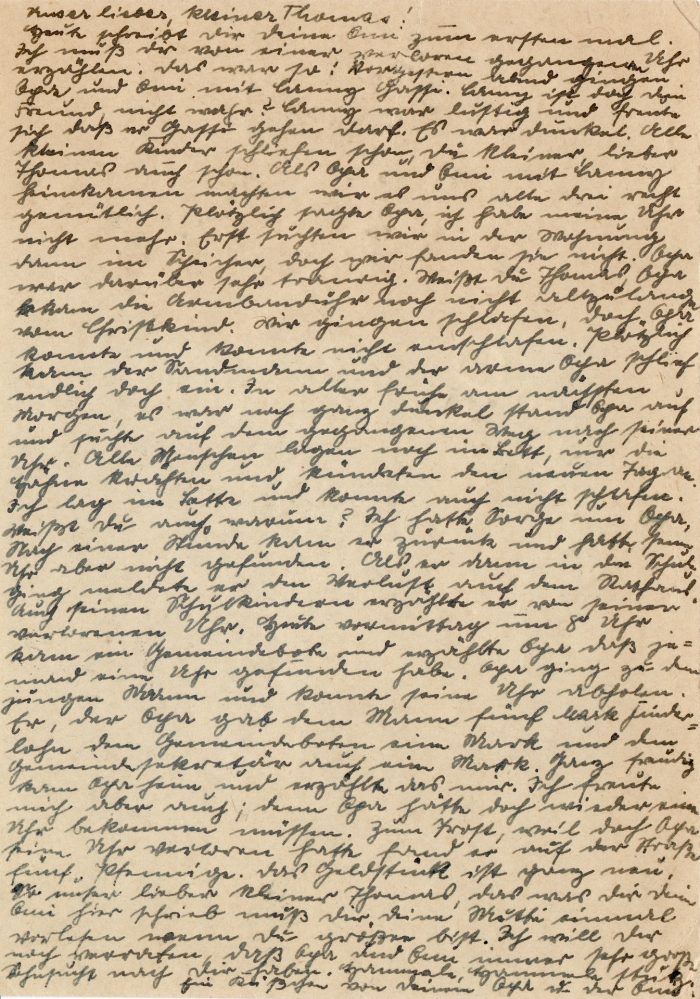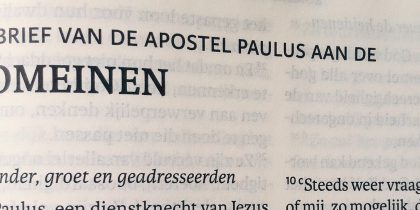Recently at Bible study, we discussed the first chapter of the 2th letter to Timothy. What stands out in this section is Onesiforus' search for Paul, who was held captive in Rome. A few brief notes on that for further reflection.
All have turned away from me
All communities in Asia had abandoned Paul, he writes in 2 Timothy 1:15. They had not kept the gospel he had brought them intact. Just as he had instructed Timothy, for example, to "keep the property entrusted to him" (2 Timothy 1:14).
He also described the core of that Gospel in the first chapter; see verses 9 and 10.
God calls man to save him from his lost condition. It is God's desire to grant grace to man on the basis of Christ Jesus, whom He promised to man in the beginning. It is God's grace without man being able to contribute to it in the slightest. It became a reality when the Lord Jesus Christ became man and died on the cross. He nullified death for everyone who believes in Him. Through Jesus Christ, this gospel is now public proof that there is "life and imperishability" available to every person who wants to be saved and believes.
But in Asia, the Christians apparently lost all this. Certain parts were left out and possibly other things (myths) added. In any case, it was no longer the pure gospel that Paul had preached to them.
In doing so, they had not only cast aside Paul's teaching, but their relationship with the messenger had become poor. Paul says they had turned away from him.
What happened in the communities?
Asia is the western part of present-day Turkey and was a Roman province at the time. All the places mentioned in Revelation 2 and 3 were in Asia, and Ephesus was the capital of the province.
You can guess what happened in those congregations in Asia. No doubt they are things mentioned in Revelation 2 and 3 by the Lord Jesus Himself.
But the text in 2 Timothy 1 mentions something else: two names of those who have turned away. These names, too, are there for a reason, and so I take the liberty of deriving something from them as well.
The first is Fygellus, whose name means "refugee. Now the command for every believer is to "do good to all men" (Galatians 6:10), including refugees. There can be no mistake about that. But we try to look at the situation surrounding Fygellus a little differently.

Fygellus is a refugee who ends up in a Christian congregation. Someone who apparently fled a difficult situation and then was well taken care of in the Christian congregation. He was provided with what he needed. His loneliness was gone, he made new friends there, and he felt at home. He stayed there, but not because he believed the gospel and accepted Christ as Savior. He was there for the social contacts and the safety net they provided him.
Fygellus is thus possibly a prototype of the Christian who sees his community of faith primarily as a social network that then also propagates the gospel. But then a gospel that is primarily a social gospel. In which the witness of conversion to God and faith in Jesus Christ is no longer necessary.
The second person is Hermogenes, whose name is "son of Hermes' or 'son of Mercury' means. Given the gods' names Hermes and Mercury, we can safely assume that Hermogenes was someone who came to faith from a pagan background. But he probably did not leave behind all pagan practices and ideas, so that he too mutilated Paul's Gospel with pagan views (cf. also here).
That a Christian community can lose the Gospel of God because of this kind of influence is easy to imagine and you can see it happening around you. Paul's teaching is little talked about anymore and people think that the Gospel of God is mainly found in the four gospels.
Onesiforus - a useful service
Added to that was the fact that Paul had been imprisoned in Rome precisely because of the gospel. So in addition to the spiritual distance with the Christians in Asia Minor, there was now also a physical distance, so you couldn't just run into Paul.
Yet there was someone who sought out Paul: Onesiforus. His name means something like "one who brings usefulness. Apparently, it was someone who was useful, including to the church in Ephesus, where he served (1:18).
Possibly he also served Paul there, at least when we judge from the translation of that text in the EBV24 translation, where it says "how he me served in Ephesus, you know very well."
But Onesiforus did not stop there, but sought him out in Rome to be of use to Paul. He brought the encouragement Paul needed (1:16).

Also in Corinth were men who sought Paul out: Stefanas, Fortunatus and Archaic (1 Corinthians 1:17,18). They refreshed his mind, he writes. That can hardly mean anything other than that they spoke to him about the Gospel of God and about the Lord Jesus Christ. Such was undoubtedly the case with Onesiforus. His example may encourage us to seek out fellow believers and encourage them in the faith. For if even the greatest apostle had a need for this, how would it not be the case with us who are but "ordinary" believers?
Paul in Rome
We live in a time when Christendom is increasingly in decline. The Roman church (Rome) increasingly dominates the Christian yard and Roman contemplation invades all communities. It is what Paul also describes in his two letters to Timothy. Then it comes down to personal faith that we must hold on to (2 Timothy 1:14). In this, Paul's teaching is incredibly important.
Even in the spiritual Rome of today, Paul is as it were imprisoned. What he received from God and taught us is rather hidden in Christendom today; around you you can hardly find it.
But we too are urged by Onesiforus to engage again with Paul's teaching. Especially also in the Romans letter which deals with the whole Gospel of God and then the other letters which, on the one hand, show Christ's glory, but also warn us against all the threats that are on the apostle convention (Acts 15) are established. Like Onesiforus, we must "diligently seek Paul to find him.
The beginning and end of the letter to the Romans
Let's just conclude with the first and last texts of the letter to the Romans. Both sections are about the Gospel of God, which God promised and for which Paul was a special apostle.

Paul, a servant of Jesus Christ,
a called one and an apostle,
Who is set apart for the Gospel of GOD
- which He promised from the beginning through His prophets in the Holy Scriptures - concerning His Son,
who as to the body was born of the seed of the house of David
and through the power and Holy Spirit that is Jesus Christ our Lord,
raised from the abode of the dead,
revealed as the Son of GOD.
For through Him we have received grace and apostleship among all nations,
That they may be obedient to faith in His Name, for you too have been called from among the nations by Jesus Christ.
To all who are in Rome,
beloved of GOD, called and saints:
peace and mercy be with you from GOD our Father,
and of our Lord Jesus Christ.
(Romans 1:1-7 EBV24)
To Him who is in power to confirm you
through my Gospel
- the Gospel proclaimed about Jesus Christ
through the revelation of the mystery that has been hidden for centuries,
but which has now been revealed by the prophetic scriptures
and has been made known by order of the eternal GOD to all nations, that they may obey by faith -
To Him the only Wise, be glory through Jesus Christ to all eternity.
Amen.
The grace of our Lord Jesus Christ be with you all.
Amen.
(Romans 16:24-27 EBV24)



